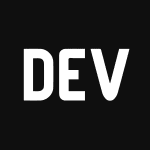When I started coding, I didn't realize how much I didn't know. There is so much terminology that it can be confusing to get started. That's why so many professional devs have spent their time and energy to write documentation and give tips to beginners.
In an earlier installment of this series, we've talked about how to get involved in the community and build your professional profile. In this post, I would like to introduce you to ways that DEV can help you focus on your goals.
Follow topics you care about
DEV’s tag system keeps the site’s content well organized. You can use tags on DEV to find help, discuss topics, or gain viewership in whichever category you are in. Once you have followed a few different tags, you can manually change how frequently they show up in your feed. You can visit https://dev.to/dashboard/following to change each tag’s following weight individually. Using tags, you can curate your DEV experience to be personalized for the topics you're interested in.
Every tag has its own submission guidelines. For example, the #challenge tag requires that you present some kind of actionable question or task to the community that can be fulfilled in a comment.
When you're writing your own posts, keep in mind that each post has a maximum limit of four tags. Make sure to follow the submission guidelines for each tag. It can also help to think about your audience— for instance, a very technical Py3 post might not get much viewership in #beginners, but screencaps of your WIP indie title might do great on #gamedev. Since developers from all skill levels post on DEV, tags are an easy way to look for pointers on some code you may be stuck on.
You can check out the Top 100 Tags to get an idea of what's popular on DEV right now.
What's next?
So, you’re more than a beginner, maybe you know a little C++ or HTML and you want to put your skills to work. Contributing to open-source is a great way to help other programmers, while also improving your own skills.
When you’re making your first PRs, please read the contributing guidelines. Many maintainers will have guides available to keep the repo and the PR process organized. If they aren’t present in the repo, contact the maintainer.
Anyone can contribute to a repo, even if you don’t know a word of code. Expanding already existing documentation is always appreciated, especially when there are missing steps or language errors. Maybe even a screenshot would help. No contribution is too small or insignificant.
If you're interested, take a look at our repo. Ben wrote an awesome post on contributing to DEV this past Hacktoberfest:


How to contribute to DEV this hacktoberfest
Ben Halpern for The DEV Team ・ Oct 1 '19
Stay Motivated
The important thing is to get motivated and retain that feeling. Lots of folks suggest writing to yourself about why you want to code and how you want to use it. It can be very effective to lay out your thoughts and determine what is important to you in the coding industry.
There are so many different fields in CS that it can get difficult to choose what career path you want to focus on. It’s important to remember that you can change your job, programmers are capable of wearing many different hats. There are hobbyists, corporate developers, remote developers, tech startup founders, freelancers, open source contributors, indie game designers, hackers, each of them earning a living by following their passions. Here are some posts from the DEV Community to inform and inspire you:

I reviewed 200+ PRs in 10 days - Here is what I learned
Bhupesh Varshney 👾 ・ Nov 15 '19

Avoid Burnout and Get Back to the Basics
Andrew Davis ・ Apr 2 '18

Umm are you looking for some motivation?
Riya Dashoriya ・ Oct 31 '19
Thanks for reading! In our final post, we'll share some tips for landing the first job.






Top comments (0)